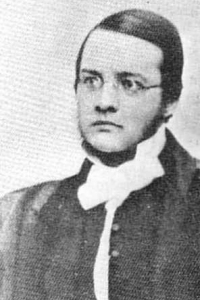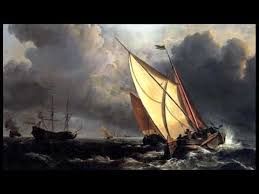
As little paper poppies begin to grace lapels, we enter the Remembrance season. So in this post our focus is on what is popularly known as the Navy Hymn: ‘Eternal Father, strong to save’ by William Whiting, to the tune MELITA by John B. Dykes.
William Whiting (1825-78) was educated at Winchester College, and subsequently became Master of the Choristers’ School at that same institution. In 1860 he was approached by a student, about to travel to the United States, but with a morbid fear of the sea crossing. Whiting shared an experience he had as a young man, where his boat had been caught in a ferocious storm, and only spared – Whiting believed – by the grace of God. Reflecting on the student’s fears, he wrote the words to this hymn, which are believed to have also been inspired by Psalm 107. They were immediately picked up by the editors of Hymns Ancient and Modern, who included them in that hymnal’s first edition the following year. Whiting would revise the text several times in subsequent years, and later authors have attempted – with varying degrees of success – to include new verses to suit land, air and even space travel. The hymn had been adopted by both the Royal Navy and US Navy by the 1890s, and has become a mainstay of military funerals, particularly of sailors. It was a particular favourite of Winston Churchill, and has been performed at the state funerals of several US presidents – truly showing an appeal across the ocean as if to match its own theme.
John Bacchus Dykes (1823-76) was an enormously prolific writer of hymn tunes, having over three hundred published to his name. A graduate of St Catherine’s College, Cambridge, he went on to become Precentor of Durham Cathedral from 1849-62, where he wrote most of his famous works, including:
- NICAEA (‘Holy, holy, holy! Lord God Almighty!’)
- DOMINUS REGIT ME (‘The King of Love my shepherd is’)
- GERONTIUS (‘Praise to the Holiest in the height’)
- WIR PFLUGEN (‘We plough the fields, and scatter’)
MELITA was written specifically for Whiting’s text, and done to order for Hymns Ancient and Modern in 1861, where it first appeared. It is particularly successful in its evocation of the subject matter: if played with enough depth on an organ, the major seventh chords and chromatic leading notes are suitably ominous, giving a pervading sense of dread that is not brightened until the very last line of each verse. And the name? ‘Melita’ is the Latin name for Malta, where the Apostle Paul was once shipwrecked.
A Cathedral full of servicemen and veterans from Portsmouth:
https://www.youtube.com/watch?v=BjcSpCSUjdk
From the D-Day 70th anniversary commemorations at Arromanches, Normandy:
https://www.youtube.com/watch?v=wiWPojoUyaA
David Christiensen plays an organ arrangement by Steven Scott:
https://www.youtube.com/watch?v=IacnztfBgEA
As ever, this post’s descant is free to download and use, so please do so, and let us know how you get on. And we’d be delighted to receive any audio or video of your attempts.
If you’re choosing hymns for a Remembrance service, this one may well be near the top of your list. But bear in mind that a quick Google will give you several versions – published or unofficial – with alternative verses that better reflect the role of all the armed forces.
And you won’t need me to remind you of all the other perennials we hear at this time of year:
- Abide with me (Henry Lyte)
- For the healing of the nations (Fred Kaan)
- God is our strength and refuge (Richard Bewes)
- God save our gracious Queen (Anon.)
- He who would valiant be (John Bunyan / Percy Dearmer)
- I vow to thee, my country (Cecil Spring-Rice)
- O God, our help in ages past (Isaac Watts)

